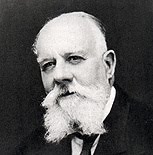<Back to Index>
- Philosopher Édouard Louis Emmanuel Julien Le Roy, 1870
- Poet Gabriello Chiabrera, 1552
- 1st Supreme Director of the United Provinces of the Río de la Plata Gervasio Antonio de Posadas y Dávila, 1757
PAGE SPONSOR

Édouard Louis Emmanuel Julien Le Roy (June 18, 1870 Paris – November 10, 1954 Paris) was a French philosopher and mathematician.
Le Roy was received at the École Normale Supérieure (ENS) in 1892, and at the agrégation in mathematics in 1895. He became Doctor in Sciences in 1898, taught in several high schools, and became in 1909 professor of mathematics at the Lycée Saint - Louis in Paris.
From then on, Le Roy took an important interest in philosophy and metaphysics. A friend of Teilhard de Chardin and Henri Bergson's closer disciple, he succeeded to him at the College of France (1922) and, in 1945, at the Académie française. In 1919, Le Roy was also elected member of the Académie des Sciences morales et politiques.
Le Roy was especially interested in the relations between science and morality. Along with Henri Poincaré and Pierre Duhem, he supported a conventionalist thesis on the foundations of mathematics. Although a fervent Catholic, he extended this conventionalist theory to revealed truths, which did not, according to him, withdraw any of their strength. He rejected in the domain of religion dogmas, abstract reasonings and speculative theology in favour of instinctive faith, heart and sentiment. He was one of those close to Bergson who encouraged him to turn to the study of mysticism, explored in his later works. His conventionalism led his works, charged of modernism, to be placed on the Index by the Holy See.